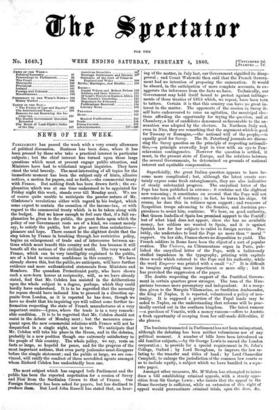tainly expose some fresh entanglements, they are also indicative of
steady substantial progress. The encyclical letter of the Pope has been published in extenso ; it contains not the slightest new reasoning ; it constitutes an avowal that the Pope will not sarrender an inch of territory ; in fact, he burns his ships. Of course, he does this in reliance upon support ; and rumours of Neapolitan troops advancing to the frontier, and Austrian pre- paredness to assist him, continue. We hear, on good authority, that Queen Isabella of Spain has promised support to the Pontiff ; but of what kind does not appear, 'since she has no available money, her soldiers are wanted in Spain, and it is against Spanish law for her subjects to enlist in foreign service. Pro- bably, she undertakes to lend the Pope no more than " moral" support. On her side, France shows no disposition to yield. The French soldiers in Rome have been the object of a sort of popular ovation. The Univers, an Intramontane organ in Paris, pub- lished the encyclical letter of the Pope, with a ludicrously studied impudence in the typography, printing with capitals those words which referred to the Pope and his authority, while the word Emperor was printed with a small "e." It is difficult to imagine anything more impertinent or more silly ; but it has provoked the suppression of the paper.
The doubts respecting the support of the Pontifical Govern- ment in certain quarters grow stronger. The tone of the Hun- garians becomes more peremptory and independent. At a recep- tion given to the Marquis Itillamarina, as Sardinian Ambassador, the King of Naples, it is reported, volunteered a policy of neu- trality. It is supposed a portion of the Papal lands may be ceded to Naples, on the understanding that reforms will be prac- tically carried out in the southern kingdom. The latest rumour —a purchase of Venetia, with a money ransom—offers to Austria a fresh opportunity of escaping from her self-made difficulties, if she pleases.


























